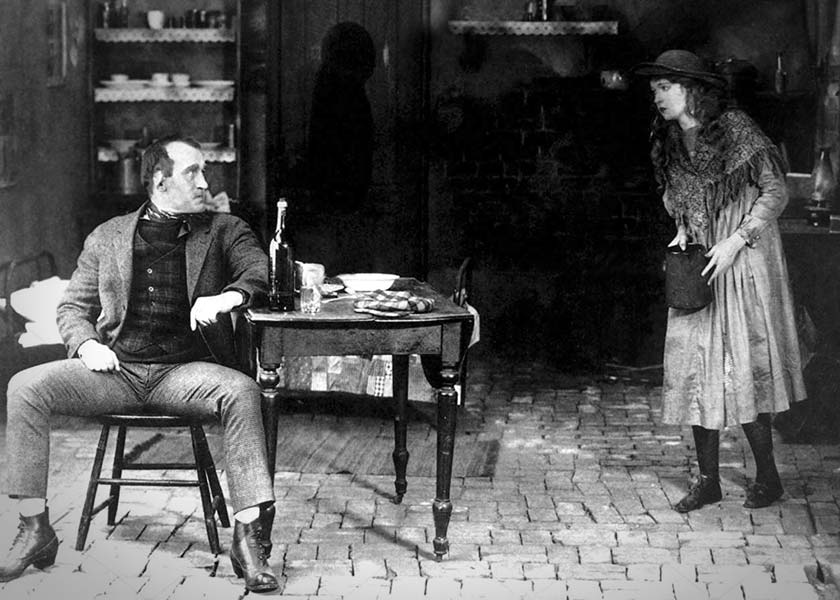Synopsis
Cheng Huan (Barhthelmess), an idealistic disciple of Buddha, holds an honored position among his friends and neighbors in his native China. On the streets, he sees people from the west, especially sailors; they seem to be particularly aggressive and prone to fighting. He leaves his home to bring the peace of Buddha to the great nation across the sea, England. Several years later, his hopes to propagate the philosophy of Buddha have been defeated by the sordid realities of life in London's Limehouse district, where he is known only as a 'Chink' storekeeper.
Living nearby are Battling Burrows (Crisp), a boxer, and his daughter, Lucy (Gish). The brutish Burrows terrorizes his daughter and treats her like a human punching bag. When Battling demands a smile, Lucy makes one artificially by pushing up the corners of her mouth. Huan watches Lucy as she creeps along the streets, and is smitten by her innate beauty, unseen by the other denizens of Limehouse.
Burrows is preparing for a boxing match, and when his manager stops his carousing,
he goes home in a rage. As Lucy is serving his dinner, she accidently burns his
hand. Despite her pleas, he whips her cruelly. She stumbles from the house and
collapses in Huan's shop. He carries her upstairs to a bed and tenderly cares for
her. His care is the first gentleness she has ever known. She asks him
What makes you so good to me, Chinky?
The Yellow Man prepares the room as
for a princess. He replaces her rags with a beautiful blue and yellow silk robe.
He names her White Blossom. As affection and pleasure enter her heart, her beauty,
which was long hidden, becomes evident. Huan dreams that she is his own and is
tempted by her, but he resolves to protect her innocence with a chaste love.
A friend of Burrows sees Lucy at Huan's shop and tells him where she is. Burrows is outraged that a 'Chink' is after his daughter. After he wins his prizefight, Burrows goes to get her and restore his honor. When he finds her, his rage terrifies her. She exclaims "'taint nothing wrong", but he does not listen or care. He forces her to dress in her rags, then smashes the room and drags her home. Huan is told that Burrows has come for Lucy. He rushes home and finds the wreckage. He cries when he finds the silk robe, then he takes his gun and goes after her.
At home, the terrified Lucy hides in a closet. As Burrows breaks the door with a
hatchet, she cries, runs in circles, and crouches on the floor. She pleads
Don't Daddy, Don't! They'll hang yer!
Burrows drags her out and beats her
with the handle of his whip. Dying, Lucy makes a last smile by lifting the corners
of her mouth with her fingers. Huan finds her dead, still smiling. Huan confronts
Burrows, and shoots him multiple times.
Huan carries Lucy back to the smashed room at this shop. He lays her on the bed, covers her with the silk robe, and places flowers on her breast. He lights a candle, sounds the bell, and prays at his shrine. Filled with grief, he says goodbye to White Blossom and stabs himself in the heart.
Discussion
Broken Blossoms is based on the short story
The Chink and the Child
, written by Thomas Burke and published in
Limehouse Nights (1916), a collection of Burke's stories about
Limehouse, London's lower-class district populated by Chinese immigrants. Like
Griffith's previous film
Intolerance (1916),
Broken Blossoms examines the destruction of beauty by insensate
brutality and prejudice. The beauty of Lucy, imperceptible to the poor and
brutalized of Limehouse, can only be seen and appreciated by the Cheng Huan, who,
despite a lifetime of failure and disillusionment, has maintained a pure and
beautiful soul. Unable to survive in such harsh and sordid surroundings, their
delicate souls at last find peace after death releases them, symbolized by
Griffith in the film's final images of ringing temple bells, and ships sailing
upon a misty sea.
Further Reading

